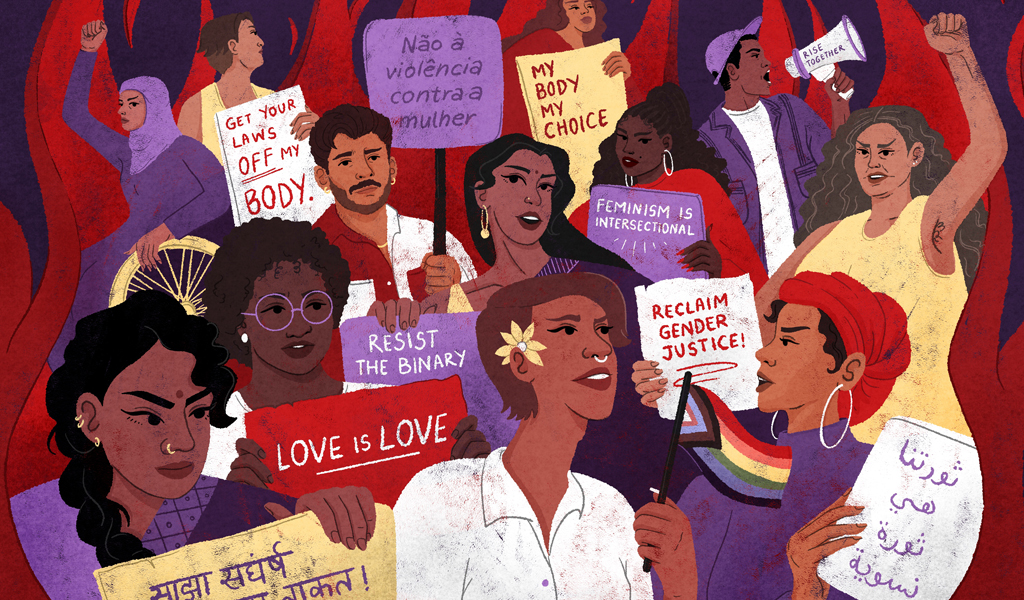New research published today in the IDS Bulletin reveals the extent to which gender and sexual rights are being reversed in a global wave of gender backlash.

The research, based on evidence from Bangladesh, Brazil, India, Kenya, Lebanon, Uganda, and the United Kingdom, explores the current wave of backlash including increased authoritarianism, religious resurgence, populist hyper-nationalism, misogyny, racism, homophobia and transphobia. The Bulletin, entitled Understanding Gender Backlash: Southern Perspectives was produced by the IDS-led Countering Backlash programme.
‘Anti-gender backlash’, at its simplest, it refers to strong negative reactions against gender justice and those seeking it. Two widely known contemporary examples, from different contexts, are Uganda’s Anti-Homosexuality Bill (passed in 2023), and the United States Supreme Court’s overturning of Roe vs Wade (which gave women the constitutional right to abortion) in 2022.
The term ‘backlash’ was first used in Susan Faludi’s (1991) analysis of the pushback against feminist ideas in 1980s in the United States, and historically, understandings of anti-gender backlash have been predominantly based on experiences and theorising about developments in the global north. More recent scholarship has afforded insights on and from Latin America and Eastern Europe.
The IDS Bulletin issue presents new ways of analysing backlash relevant to diverse development contexts, grounded examples, and evidence of anti-gender dynamics. It aims to push this topic out of the ‘gender corner’ to connect it to contemporary shifts in relationships between faith, identity and state, governance, and the broader politics of democracy and economics, as seen from across the global south.
The articles in this special issue are grouped into three themes:
- Voice and tactics: including whose voices are being heard, and what tactics are being used?;
- Framings and direction: including how are ideologies spread, and how can we understand attitudes to change?
- Temporality and structure: including what is ‘back’ about backlash? What and who drives it, and how is it imbricated in broader trends and crises?
Much explanatory work to date, if it does not implicitly generalise from global north experience, often fails to adequately engage with the ways these locally specific phenomena operate transnationally, including across the global south, and with its complex connections with a broader dismantling of democracy.
In the IDS Bulletin, experts from each of the seven countries profiled offer their analysis, rooted in their understanding of local contexts and ensuring that simple and reductive understandings of gender backlash are challenged.
For example:
- In Uganda, Amon Ashaba Mwiine and Josephine Ahikire of Makerere University analyse ongoing contestations around the stalled Sexual Offences Bill, 2019.
- In Bangladesh, the trivialisation of domestic violence is explored by Maheen Sultan and Pragyna Mahpara of the BRAC Institute of Governance and Development.
- In Brazil, the curtailing of access to legal abortion is analysed by a team of researchers from the Federal University of Bahia, with a focus on the high-profile media case of an 11-year‑old girl, pregnant after being raped.
Key recommendations
- Feminist movements, in responding to the gender backlash, need to bring together different elements that are used in social movements, feminist movements, and backlash literature.
- A better understanding of backlash and how it works across regions is a prerequisite for developing better strategies for resistance
- In complex and increasingly insecure contexts, a better understanding of the spectrum of activism suggests it should not just be defined as doing or not doing, but in these spaces, even survival can be a crucial form of activism.
By presenting new ways of analysing and countering backlash from more diverse settings, this issue of the IDS Bulletin calls for the development of better strategies and tactics for resistance and reclaiming gender justice.
Read the list of articles in this IDS Bulletin